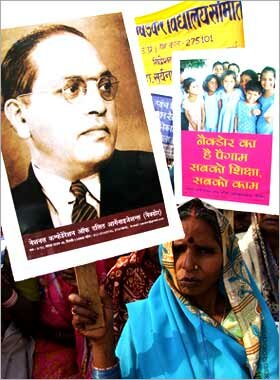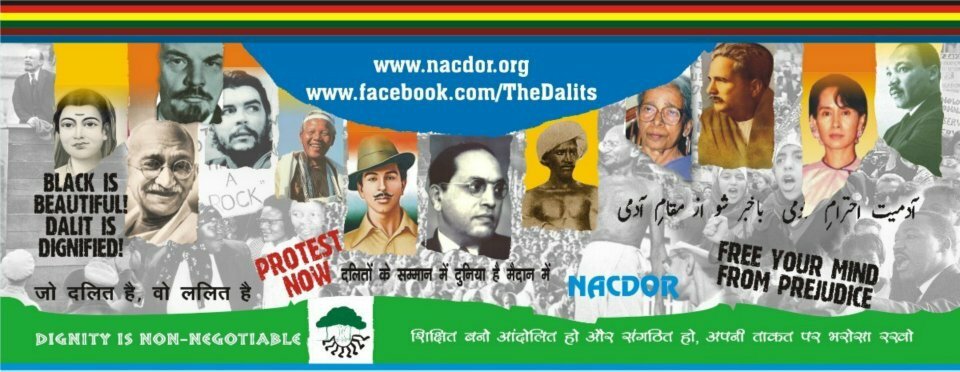Who are Dalits?
Some believe that the word Dalit has its origin in the Pali (a pre-Sanskrit language) word Daliddh, which means the deprived; while others believe that the word 'Dalit' comes from the Hindi root dal and means 'held under check', 'suppressed' or 'crushed' — or, in a looser sense, 'oppressed'. However, the word Dalit is used as an act of confident assertion, rejecting the nomenclature of Harijan, the ‘children of God’. The term was used in the 1930s as a Hindi and Marathi translation of "depressed classes", a term the British used for what are now called the Scheduled Castes. In 1930 there was a newspaper published for the depressed classes in Pune called "Dalit Bandhu" (Friends of Dalits). Dalit Panthers, a radical movement of Dalit youth in the 1970s, used this term for the first time for those who were Scheduled Castes and Scheduled Tribes, neo-Buddhist, the working-people, the land-less and poor peasants, women, and all those who are being exploited politically and socially.
 The term Dalit does not refer to a caste. It symbolizes unity of all those who suffered at the hands of iniquitous Brahmanical Social Order or Brahmanism. Dr. B.R. Ambedkar defined Brahmanism as “the negation of the spirit of Liberty, Equality and Fraternity. In that sense it is rampant in all classes and not confined to the Brahmins alone, though they have been the originators of it. This Brahmanism which pervades everywhere and which regulates the thoughts and deeds of all classes is an incontrovertible fact. It is also an incontrovertible fact that this Brahmanism gives certain classes a privileged position. It denies certain classes even equality of opportunity. The effects of Brahmanism are not confined to social rights such as inter-dinning or inter-marriage. If that was so, one would not mind it. But it is not so. It extends to civic rights as distinguished from social rights. Use of public schools, of public wells, of public conveyances, of public restaurants are matters of civic rights. Everything which is intended for the public or maintained out of public funds must be open to all citizens. But there are millions of whom these civic rights are denied. Can anyone doubt that this is the result of Brahmanism which has been let loose in this country for thousands of years and which is functioning even now as a live wire? So omnipresent is Brahmanism that it even affects the field of economic opportunities.”
The term Dalit does not refer to a caste. It symbolizes unity of all those who suffered at the hands of iniquitous Brahmanical Social Order or Brahmanism. Dr. B.R. Ambedkar defined Brahmanism as “the negation of the spirit of Liberty, Equality and Fraternity. In that sense it is rampant in all classes and not confined to the Brahmins alone, though they have been the originators of it. This Brahmanism which pervades everywhere and which regulates the thoughts and deeds of all classes is an incontrovertible fact. It is also an incontrovertible fact that this Brahmanism gives certain classes a privileged position. It denies certain classes even equality of opportunity. The effects of Brahmanism are not confined to social rights such as inter-dinning or inter-marriage. If that was so, one would not mind it. But it is not so. It extends to civic rights as distinguished from social rights. Use of public schools, of public wells, of public conveyances, of public restaurants are matters of civic rights. Everything which is intended for the public or maintained out of public funds must be open to all citizens. But there are millions of whom these civic rights are denied. Can anyone doubt that this is the result of Brahmanism which has been let loose in this country for thousands of years and which is functioning even now as a live wire? So omnipresent is Brahmanism that it even affects the field of economic opportunities.”
“Dalit is a symbol of change and revolution. Dalits believe in humanism. They reject the existence of god, rebirth and soul, sacred books that teach discrimination, fate, and the concepts of hell and heaven, because all these made them slaves.” However, today the term Dalit is generally used in a much narrower context of referring only to Untouchables (socially excluded) and Adivasis (geographically excluded communities of the past).

